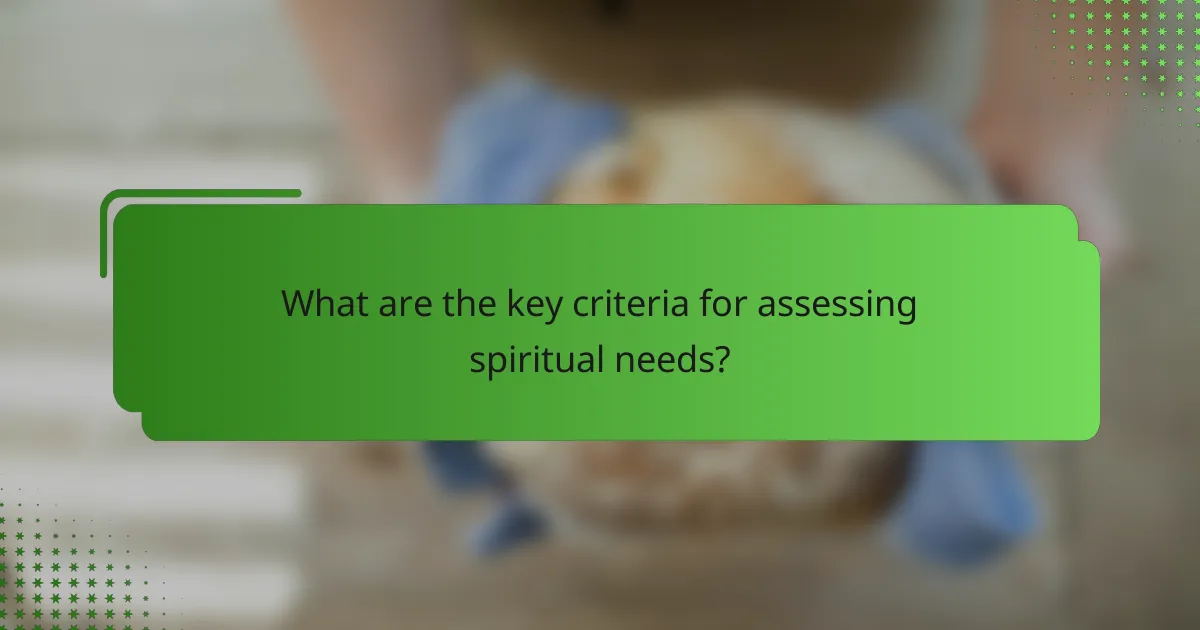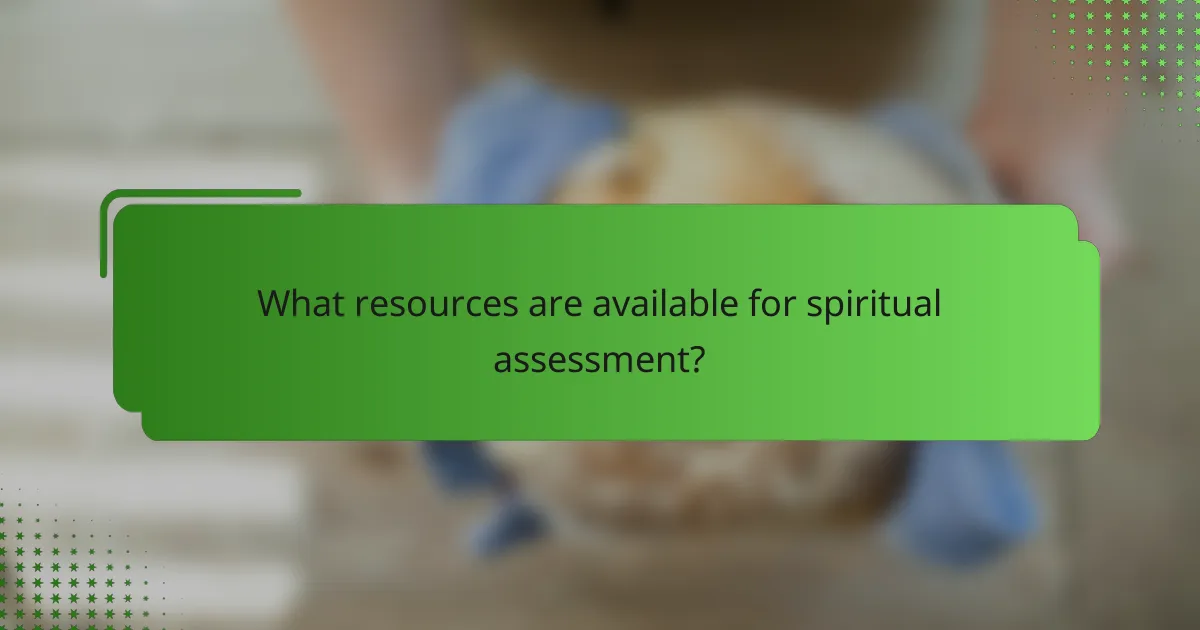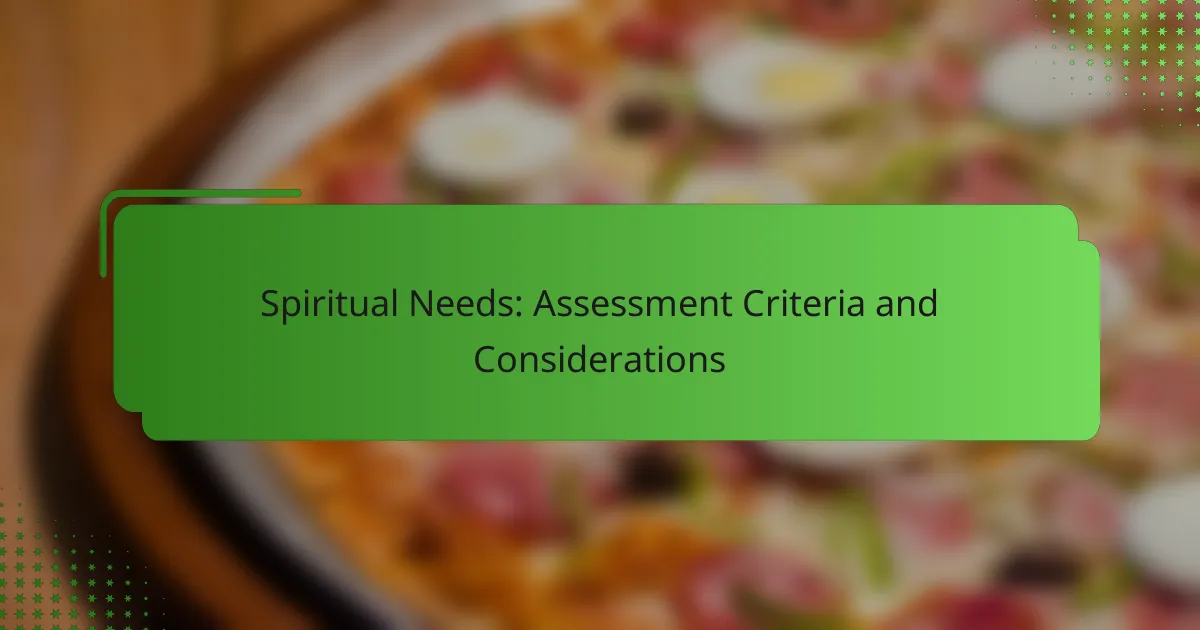Assessing spiritual needs is essential for understanding an individual’s overall well-being, encompassing emotional health, community ties, personal beliefs, and life purpose. By utilizing various evaluation methods, individuals can articulate their spiritual requirements and engage in meaningful reflection. Resources such as frameworks and online tools further support this assessment process, fostering personal growth and deeper insights into one’s spiritual journey.

What are the key criteria for assessing spiritual needs?
Key criteria for assessing spiritual needs include emotional well-being, community connection, personal beliefs, life purpose, and ritual practices. Evaluating these aspects helps individuals identify their spiritual requirements and fosters a deeper understanding of their overall well-being.
Emotional well-being
Emotional well-being is a vital component of spiritual needs assessment, as it reflects how individuals feel about themselves and their lives. Consideration of emotional health includes recognizing feelings of peace, joy, and contentment, as well as addressing anxiety, fear, or sadness.
To assess emotional well-being, individuals can reflect on their emotional responses to life events and their coping strategies. Journaling or discussing feelings with a trusted friend or counselor can provide insights into emotional health and its connection to spiritual fulfillment.
Community connection
Community connection plays a significant role in meeting spiritual needs, as social relationships often enhance feelings of belonging and support. Engaging with a community can provide individuals with shared values and experiences that nurture their spiritual growth.
To evaluate community connection, individuals should consider their involvement in social or religious groups and the quality of relationships within those networks. Participating in community events or volunteering can strengthen these connections and fulfill spiritual needs.
Personal beliefs
Personal beliefs encompass the values and principles that guide an individual’s life choices and actions. Understanding these beliefs is crucial for assessing spiritual needs, as they shape one’s worldview and influence overall well-being.
Individuals can reflect on their core beliefs by asking themselves what they value most in life, how they view morality, and what role spirituality plays in their daily lives. Engaging in discussions or reading literature that challenges or affirms these beliefs can also deepen self-awareness.
Life purpose
Life purpose refers to the sense of direction and meaning that individuals derive from their experiences and aspirations. Assessing life purpose helps identify what motivates individuals and what they hope to achieve in their lives.
To explore life purpose, individuals can consider their passions, goals, and the impact they wish to have on others. Creating a vision board or setting specific, achievable goals can help clarify and reinforce one’s sense of purpose.
Ritual practices
Ritual practices are structured activities that individuals engage in to express their spirituality and connect with a higher power or community. These practices can vary widely, from religious ceremonies to personal routines that foster mindfulness and reflection.
Assessing ritual practices involves identifying which activities resonate with an individual’s beliefs and contribute to their spiritual well-being. Regularly participating in rituals, such as meditation, prayer, or community gatherings, can enhance spiritual fulfillment and provide a sense of stability.

How can spiritual needs be effectively evaluated?
Spiritual needs can be effectively evaluated through various methods that encourage individuals to express their beliefs, values, and experiences. Understanding these needs involves using tools that facilitate reflection, gathering insights through structured formats, and engaging in meaningful conversations.
Self-reflection tools
Self-reflection tools encourage individuals to explore their spiritual beliefs and experiences privately. Journaling, meditation, and personal inventories can help people articulate their spiritual needs and identify areas for growth. This introspective approach allows for a deeper understanding of one’s values and beliefs.
Consider using guided prompts that focus on significant life events, personal values, and feelings of connection to a higher purpose. These tools can help individuals clarify their spiritual priorities and recognize what truly matters to them.
Surveys and questionnaires
Surveys and questionnaires provide a structured way to assess spiritual needs across a broader population. These tools can include multiple-choice questions, Likert scales, and open-ended responses to gauge beliefs, practices, and spiritual satisfaction. They can be administered in various settings, such as healthcare facilities or community organizations.
When designing surveys, ensure questions are clear and relevant to the target audience. Consider including questions about spiritual practices, community involvement, and personal beliefs to capture a comprehensive view of spiritual needs.
Guided discussions
Guided discussions facilitate open conversations about spiritual needs in a supportive environment. These discussions can take place in groups or one-on-one settings, allowing participants to share their experiences and insights. A skilled facilitator can help navigate sensitive topics and encourage participation.
To maximize the effectiveness of guided discussions, establish a safe space where individuals feel comfortable expressing their thoughts. Use open-ended questions to stimulate dialogue and encourage participants to explore their spiritual journeys collectively.

What resources are available for spiritual assessment?
Various resources exist for spiritual assessment, including frameworks, online tools, and literature. These resources help individuals and professionals evaluate spiritual needs and growth effectively.
Spiritual assessment frameworks
Spiritual assessment frameworks provide structured approaches to evaluate an individual’s spiritual needs. Common models include the FICA (Faith, Importance, Community, Address) and HOPE (Hope, Organized religion, Personal spirituality, Effects on medical care) frameworks, which guide practitioners in exploring spiritual dimensions during assessments.
When using these frameworks, consider the individual’s beliefs, practices, and the impact of spirituality on their overall well-being. Engaging in open conversations can enhance understanding and foster a supportive environment.
Online spiritual assessment tools
Online spiritual assessment tools offer convenient ways to evaluate spiritual health through self-assessment questionnaires and interactive platforms. Websites like Spirituality & Health and the Spiritual Assessment Inventory provide resources that can help users reflect on their spiritual journeys.
These tools often include questions about beliefs, practices, and personal experiences. Users should approach these assessments with honesty for the most accurate insights, and consider discussing results with a spiritual advisor or counselor for deeper understanding.
Books on spiritual growth
Books on spiritual growth can serve as valuable resources for personal exploration and assessment. Titles like “The Power of Now” by Eckhart Tolle and “The Seven Spiritual Laws of Success” by Deepak Chopra offer insights into spiritual development and self-reflection.
When selecting books, look for those that resonate with your beliefs and values. Engaging with these texts can provide guidance and foster a deeper understanding of one’s spiritual needs, leading to meaningful growth.

How do cultural factors influence spiritual needs?
Cultural factors significantly shape spiritual needs by determining beliefs, practices, and community connections. Understanding these influences is essential for providing holistic support that respects individual backgrounds and values.
Cultural beliefs
Cultural beliefs form the foundation of an individual’s spiritual needs, influencing how they perceive life, death, and the universe. For example, some cultures may emphasize ancestor worship, while others focus on a singular deity or multiple gods. Recognizing these beliefs helps caregivers tailor their approaches to spiritual care.
It’s important to consider that cultural beliefs can vary widely even within the same community. Engaging in open conversations can help uncover these nuances and ensure that spiritual support aligns with the individual’s worldview.
Religious practices
Religious practices are often a direct expression of cultural beliefs and can significantly impact spiritual needs. These practices may include rituals, prayer, meditation, or communal worship, which provide individuals with a sense of belonging and purpose. Understanding the specific rituals associated with different religions is crucial for effective spiritual assessment.
For instance, someone from a Christian background may find solace in prayer and church attendance, while a Buddhist may prioritize meditation and mindfulness. Tailoring spiritual care to accommodate these practices can enhance the overall well-being of individuals.
Community rituals
Community rituals play a vital role in fulfilling spiritual needs by fostering a sense of connection and shared identity. These rituals can range from seasonal celebrations to life milestones, such as weddings or funerals, and often reflect the community’s cultural values. Participation in these events can provide emotional support and reinforce spiritual beliefs.
Being aware of local community rituals is essential for caregivers. For example, in many Indigenous cultures, community gatherings are integral to spiritual health, and recognizing the significance of these events can strengthen the support provided to individuals within those communities.

What role do mental health professionals play in spiritual assessments?
Mental health professionals play a crucial role in spiritual assessments by integrating clients’ spiritual beliefs and practices into their overall mental health care. This approach helps to address the holistic needs of individuals, recognizing that spirituality can significantly influence mental well-being.
Integration of spirituality in therapy
Integrating spirituality into therapy involves understanding a client’s spiritual beliefs and how these beliefs impact their mental health. Therapists can use techniques such as open-ended questions to explore spiritual experiences and values, which can lead to deeper insights and healing.
For example, a therapist might encourage a client to reflect on how their faith influences their coping strategies during difficult times. This integration can enhance the therapeutic alliance and foster a more personalized treatment plan.
Collaboration with spiritual leaders
Collaboration with spiritual leaders can enrich the spiritual assessment process by providing additional support and resources for clients. Mental health professionals may refer clients to spiritual leaders for guidance or involve them in therapy sessions when appropriate.
Establishing a network with local spiritual leaders can help professionals understand community resources and cultural contexts, which is essential for effective spiritual assessments. This collaboration can also facilitate a more comprehensive approach to care, addressing both psychological and spiritual needs.

What are the common misconceptions about spiritual needs?
Many people mistakenly believe that spiritual needs are synonymous with religious practices or that they are uniform across individuals. In reality, spiritual needs are deeply personal and can vary widely, encompassing a range of beliefs, values, and experiences.
Spirituality vs. religion
Spirituality and religion are often conflated, but they represent different concepts. Religion typically involves organized practices, doctrines, and communal worship, while spirituality is more individual and can exist outside of formal religious structures.
For example, someone may identify as spiritual but not adhere to any specific religion, finding meaning through personal reflection, nature, or philosophical inquiry. Understanding this distinction is crucial for addressing spiritual needs effectively.
Assuming uniformity in spiritual experiences
A common misconception is that everyone experiences spirituality in the same way. In truth, spiritual experiences are highly subjective and influenced by personal history, culture, and individual beliefs.
For instance, one person may find spiritual fulfillment through meditation, while another may seek it through community service or artistic expression. Recognizing this diversity is essential for providing appropriate support and resources to meet varied spiritual needs.










